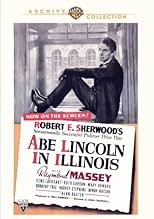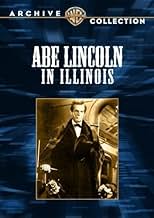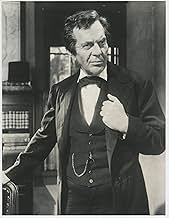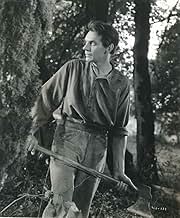CALIFICACIÓN DE IMDb
7.3/10
2.2 k
TU CALIFICACIÓN
Humble Abraham Lincoln se gana el respeto de sus vecinos de Illinois, creciendo en estatura y respeto hasta que es elegido presidente en 1860 y se marcha a Washington.Humble Abraham Lincoln se gana el respeto de sus vecinos de Illinois, creciendo en estatura y respeto hasta que es elegido presidente en 1860 y se marcha a Washington.Humble Abraham Lincoln se gana el respeto de sus vecinos de Illinois, creciendo en estatura y respeto hasta que es elegido presidente en 1860 y se marcha a Washington.
- Dirección
- Guionistas
- Elenco
- Nominado a 2 premios Óscar
- 2 premios ganados y 2 nominaciones en total
Howard Da Silva
- Jack Armstrong
- (as Howard da Silva)
Opiniones destacadas
I absolutely loved this movie! maybe it is because I am a history buff but I thought it was wonderful!. I am currently doing a project on Abraham Lincoln where my friends and I on working on a student directed film about Abraham Lincoln and you can not imagine how much this movie has helped me. This movie tells the tale of one of the greatest man in history and how he evolved along the way to become even greater. I can only hope that this movie will help someone see the wonders of his life as it helped me and as Honest Abe helped so many other people. I loved it when they showed his debate with Stephen Douglas. That was really the highlight of the movie because it showed him giving his real opinion and it caught my attention. His speech was amazing!! 10 thumbs up!!!! :D
With all due respect to Henry Fonda, Walter Huston, and a myriad of other cinematic Lincolns, Raymond Massey is the Abe to end all Abes. His moving and mesmerizing performance gives us the real Mr. Lincoln in all his complexity. Alongside the warmth, compassion and humor for which we love and revere Mr. Lincoln, we see in Massey the dark side as well: the doubts, fears, indecision and deep melancholia with which Abraham Lincoln struggled his whole life, and which clashed with his fierce ambition. Ruth Gordon is superb as Lincoln's equally ambitious wife, Mary Todd Lincoln. No hagiography, this movie lets us see the Lincolns as human beings with real "issues", rather than mere heroes of history.
Besides all this, we have Massey's astonishing physical resemblance to Lincoln.
What's most amazing is that the spirit of this most quintessentially American of our American heroes should be so wonderfully captured and portrayed by.... a Canadian!
Besides all this, we have Massey's astonishing physical resemblance to Lincoln.
What's most amazing is that the spirit of this most quintessentially American of our American heroes should be so wonderfully captured and portrayed by.... a Canadian!
Besides Raymond Massey, a whole flock of actors have been known for playing America's sixteenth president, Henry Fonda, Walter Huston, Sam Waterston, Hal Holbrook, Dennis Weaver, Gregory Peck, John Carradine. Character actor Frank McGlyn practically made a career of playing The Great Emancipator whenever Honest Abe was a character in a film. But the standard has been set by Raymond Massey who did Lincoln in Robert Sherwood's play for 472 performances on Broadway during the 1938-1939 season and he repeats the title role in Abe Lincoln in Illinois for this film version.
I've no doubt that Sherwood used as source material for his play a lot of information based on Carl Sandburg's biography, Lincoln the Prarie Years. At that time Sandburg was considered the unofficial custodian of the Lincoln legend and mythology. Of course he based a lot of his work on the biography of Lincoln written by his law partner William Herndon played here by Alan Baxter. Herndon's well known antipathy for Mary Todd Lincoln as the shrewish wife of his good friend comes through her in Ruth Gordon's portrayal. It should be said that Mary Lincoln regarded Herndon as an opportunist drunk and he certainly did have a substance abuse problem.
Gene Lockhart as Lincoln's rival Stephen A. Douglas is well done also, though Lockhart was a bit tall for the part. Had Douglas ever been elected president he would have been our shortest president, he was barely over five feet tall. The rivalry between these two was kind of like the Yankees and Red Sox with the Yankees always coming out on top until recent years. Lincoln is still our tallest president at 6'4" so the contrast on the speaking platform at the Lincoln-Douglas debates was really something to see.
The only other actor to recreate his stage role besides Massey was Howard DaSilva who played Jack Armstrong. Not the All American hero, but the leader of the local gang of roughnecks who Lincoln beat in a wrestling match and who becomes his lifelong friend. All part of the Lincoln legend carefully preserved by Sandburg and Sherwood. It was one of DaSilva's earliest screen roles.
Raymond Massey got an Academy Award nomination for Best Actor in 1940 and he was up against a strong field that included Henry Fonda for The Grapes of Wrath, Charles Chaplin for The Great Dictator, and Laurence Olivier in Rebecca. The winner however was a long-shot, James Stewart for The Philadelphia Story. There was a lot of sentiment that year that Stewart should have received the Oscar the year before for Mr. Smith Goes to Washington. So the good Academy voters made up for it this year. It goes that way with Oscar every so often.
Abe Lincoln in Illinois still holds up very well although today's historical Lincoln specialists might have different interpretations placed on some of the events you see.
I've no doubt that Sherwood used as source material for his play a lot of information based on Carl Sandburg's biography, Lincoln the Prarie Years. At that time Sandburg was considered the unofficial custodian of the Lincoln legend and mythology. Of course he based a lot of his work on the biography of Lincoln written by his law partner William Herndon played here by Alan Baxter. Herndon's well known antipathy for Mary Todd Lincoln as the shrewish wife of his good friend comes through her in Ruth Gordon's portrayal. It should be said that Mary Lincoln regarded Herndon as an opportunist drunk and he certainly did have a substance abuse problem.
Gene Lockhart as Lincoln's rival Stephen A. Douglas is well done also, though Lockhart was a bit tall for the part. Had Douglas ever been elected president he would have been our shortest president, he was barely over five feet tall. The rivalry between these two was kind of like the Yankees and Red Sox with the Yankees always coming out on top until recent years. Lincoln is still our tallest president at 6'4" so the contrast on the speaking platform at the Lincoln-Douglas debates was really something to see.
The only other actor to recreate his stage role besides Massey was Howard DaSilva who played Jack Armstrong. Not the All American hero, but the leader of the local gang of roughnecks who Lincoln beat in a wrestling match and who becomes his lifelong friend. All part of the Lincoln legend carefully preserved by Sandburg and Sherwood. It was one of DaSilva's earliest screen roles.
Raymond Massey got an Academy Award nomination for Best Actor in 1940 and he was up against a strong field that included Henry Fonda for The Grapes of Wrath, Charles Chaplin for The Great Dictator, and Laurence Olivier in Rebecca. The winner however was a long-shot, James Stewart for The Philadelphia Story. There was a lot of sentiment that year that Stewart should have received the Oscar the year before for Mr. Smith Goes to Washington. So the good Academy voters made up for it this year. It goes that way with Oscar every so often.
Abe Lincoln in Illinois still holds up very well although today's historical Lincoln specialists might have different interpretations placed on some of the events you see.
I have seen this film probably 15 times or more and have been a devotee of the Lincoln mythology (for lack of a better term) for nearly 20 years. I remember first seeing the film as a youngster on the same weekend as the death and funeral of President Kennedy in November of 1963. At that time, the two scenes that struck me as most memorable to my young mind was the one where the local woman tells Lincoln that he is the homeliest man in the county; and, the other scene where Lincoln is telling the slightly off-color joke to a crowd about the man fighting the bear. Also, another visual that sticks in my memory is the somewhat haunting scene where Lincoln revisits New Salem after the once thriving city has become a ghost-town.
There are several marvelous aspects of this movie. To begin with, is the near perfect physical and emotional representation of Lincoln by Raymond Massey. Given the photographs of the pre-president Lincoln, making Massey into sixteenth president seems nearly ordained from the beginning. The height, facial structure, and body type is nearly a perfect fit. Regarding how Lincoln spoke, it is hard to determine if that is an accurate representation or not. Historical accounts of Lincoln says that he had a rather high and not necessarily soothing voice. Since, it would be another 30 plus years before there is any kind of recording device, Massey's voice should seem appropriate enough.
Additionally, the cinematography is excellent. The on-location or natural shots are superior by black and white standards. Even though I am a devotee of black and white films, color films seem to have the upper hand when filming wide-open or rustic environments. The feel of the indoor scenes such as the ones within the Lincoln Springfield home is nearly perfect for the times. You can virtually smell the cigar smoke or the burning wood stove. Finally, the lighting during the campaign speech scenes are awesome.
But, the best part of the movie is how even with some artistic license the characters surrounding Lincoln are historically strong and represent in a film microcosm a very accurate historical reality of Lincoln's early years. For example, starting with Ruth Gordon's portrayal of Mary Linoln Todd. With her character, you can easily feel how much she effected Lincoln. Her persistent pressure on Lincoln to achieve political importance and her hard-nose, sometimes loving, sometimes bitter prescience is from my historical reading just about perfect. Since the film takes place before Lincoln is actually president, Mary Todd Lincoln's shenanigans within the White House or her emotional unraveling in her later years is not an issue here.
The romance demonstrated between Lincoln and Ann Rutledge, although later to be historically challenged, then even later to be considered historically (possibly) significant, is quite sadly moving. It is nicely juxtaposition-ed against the image of Mary Lincoln Todd.
Howard De Silva as New Salem's local ruffian is although somewhat embellished, still represents Lincoln's ability to relate to people from all walks of life. The film just seems to find the vital essence of young Lincoln before he became president.
The surreal, final scene of Lincoln leaving Springfield for Washington D.C. (again although actually happening during the day during a rainstorm)after giving one of his many great historical speeches ("this is where I have lived") catches the eerie but profound feel of how important his leadership is going to mean to the struggling republic. The playing of the "Battle Hymnn of the Republic" although premature, is still simple perfect.
There are several marvelous aspects of this movie. To begin with, is the near perfect physical and emotional representation of Lincoln by Raymond Massey. Given the photographs of the pre-president Lincoln, making Massey into sixteenth president seems nearly ordained from the beginning. The height, facial structure, and body type is nearly a perfect fit. Regarding how Lincoln spoke, it is hard to determine if that is an accurate representation or not. Historical accounts of Lincoln says that he had a rather high and not necessarily soothing voice. Since, it would be another 30 plus years before there is any kind of recording device, Massey's voice should seem appropriate enough.
Additionally, the cinematography is excellent. The on-location or natural shots are superior by black and white standards. Even though I am a devotee of black and white films, color films seem to have the upper hand when filming wide-open or rustic environments. The feel of the indoor scenes such as the ones within the Lincoln Springfield home is nearly perfect for the times. You can virtually smell the cigar smoke or the burning wood stove. Finally, the lighting during the campaign speech scenes are awesome.
But, the best part of the movie is how even with some artistic license the characters surrounding Lincoln are historically strong and represent in a film microcosm a very accurate historical reality of Lincoln's early years. For example, starting with Ruth Gordon's portrayal of Mary Linoln Todd. With her character, you can easily feel how much she effected Lincoln. Her persistent pressure on Lincoln to achieve political importance and her hard-nose, sometimes loving, sometimes bitter prescience is from my historical reading just about perfect. Since the film takes place before Lincoln is actually president, Mary Todd Lincoln's shenanigans within the White House or her emotional unraveling in her later years is not an issue here.
The romance demonstrated between Lincoln and Ann Rutledge, although later to be historically challenged, then even later to be considered historically (possibly) significant, is quite sadly moving. It is nicely juxtaposition-ed against the image of Mary Lincoln Todd.
Howard De Silva as New Salem's local ruffian is although somewhat embellished, still represents Lincoln's ability to relate to people from all walks of life. The film just seems to find the vital essence of young Lincoln before he became president.
The surreal, final scene of Lincoln leaving Springfield for Washington D.C. (again although actually happening during the day during a rainstorm)after giving one of his many great historical speeches ("this is where I have lived") catches the eerie but profound feel of how important his leadership is going to mean to the struggling republic. The playing of the "Battle Hymnn of the Republic" although premature, is still simple perfect.
If only we could've cloned Mr. Massey back in 1940, and then waited for a scriptwriter who could take a more controlled hand with historical accuracy than was fashionable in those days, and released the movie today...this remains my favorite treatment of one of my favorite historical figures; Massey seems born to have played Lincoln, from the obvious physical resemblance to the supposed mannerisms, and in doing so far outshines other Lincoln performances (Fonda's and Peck's come to mind). My peeve with the film is with historical detail, and I realize that Hollywood willingly sacrifices accuracy for dramatic artifice without so much as a blush...
¿Sabías que…?
- TriviaAfter his success playing Lincoln in the film and on Broadway, Raymond Massey began to assume the character in real life. He often appeared at social gatherings dressed in Lincoln-esque attire, assuming a Lincoln-like manner and speech. His friend, the playwright George S. Kaufman, observed, "Massey won't be satisfied until someone assassinates him."
- ErroresWhen results for the 1860 election are being received, West Virginia is listed on the the state-by-state tally board. West Virginia didn't become a state until 1863, when it broke off from Virginia after that state had seceded from the Union.
- Citas
Mentor Graham: Well, Abe, there are always two occupations open to those who have failed at everything else: school teaching and politics.
- ConexionesFeatured in History Brought to Life (1950)
- Bandas sonorasOld Abe Lincoln Came Out of the Wilderness
(uncredited)
Traditional
Sung by chorus over opening credits
Selecciones populares
Inicia sesión para calificar y agrega a la lista de videos para obtener recomendaciones personalizadas
- How long is Abe Lincoln in Illinois?Con tecnología de Alexa
Detalles
Taquilla
- Total en EE. UU. y Canadá
- USD 1,451,880
- Tiempo de ejecución1 hora 50 minutos
- Color
- Relación de aspecto
- 1.37 : 1
Contribuir a esta página
Sugiere una edición o agrega el contenido que falta

Principales brechas de datos
By what name was El libertador (1940) officially released in India in English?
Responda





































